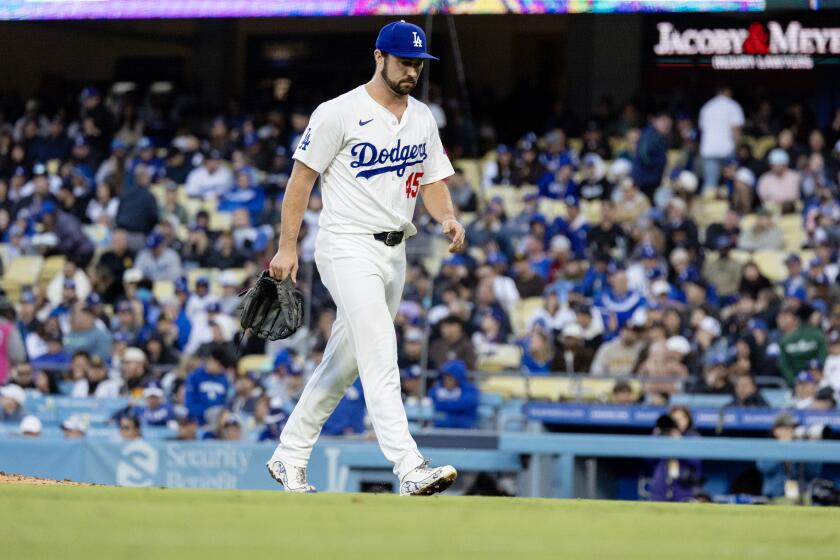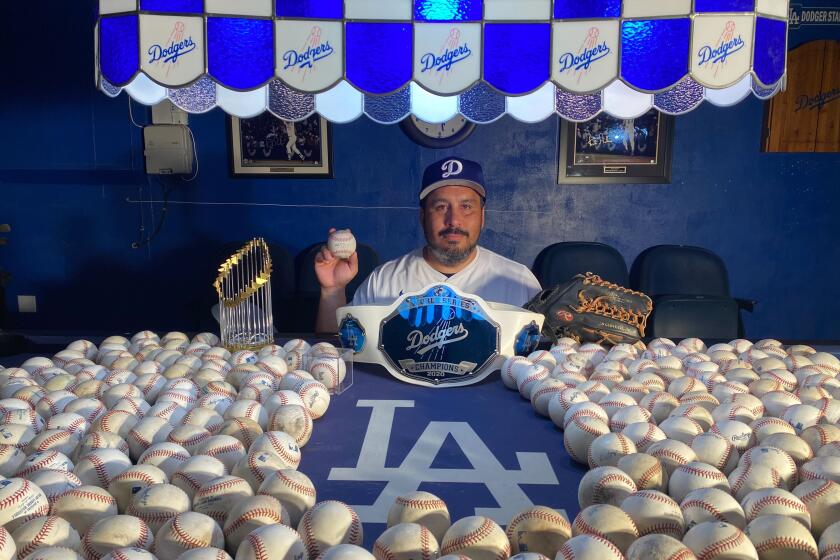Dee Gordon’s cred with Dodgers is on the rise
Carl Crawford batted sixth Friday in the Dodgers’ 5-4, 11-inning loss to the Colorado Rockies, a move that Manager Don Mattingly insisted wasn’t a demotion.
Rather, the change was explained as an endorsement of Dee Gordon, who moved into the leadoff position.
“It seems like that’s the place where Dee is the freest,” Mattingly said.
BOX SCORE: Colorado 5, Dodgers 4 (11 innings)
Two years after a failed experiment to make him the Dodgers’ everyday shortstop, Gordon is flourishing as their primary second baseman.
He leads the major leagues with 12 steals. He entered the series against the Rockies with a .357 average and .395 on-base percentage.
“Hitting him seventh is kind of OK because he can still run a little bit, but up there, he can cause havoc, especially if he continues to get on like this,” Mattingly said.
Gordon’s emergence might permit Mattingly to do something with the top of the lineup that he been unable to do with the outfield: Introduce a measure of stability.
With Gordon batting leadoff and Yasiel Puig second, Crawford hit lower than second for the first time this season. Mattingly said this had nothing to do with Crawford’s .222 average entering the game, a mark he claimed was deceptive.
“I feel like Carl’s swinging the bat really well, honestly,” Mattingly said. “He’s hitting the ball on the nose. I feel we can use him there. He’ll have a chance to drive in runs. He also can still run. We feel like we have a better lineup with him right there.”
Gordon and Puig produced immediately.
Puig hit an opposite-field home run off Jordan Lyles in the first inning to move the Dodgers in front, 1-0.
Gordon’s infield double in the third inning led to a run that tied the game 2-2.
That wasn’t a misprint. Gordon reached second base on a ground ball that didn’t leave the infield.
He slapped a ball to second baseman DJ LeMahieu’s left. LeMahieu prevented the ball from skipping into the outfield, but couldn’t immediately secure it in his glove, granting the fleet-footed Gordon enough time to fly into second base.
Gordon scored on a single by Puig.
In the hours leading up to the game, Gordon reflected on his road here.
With Hanley Ramirez taking over at shortstop, Gordon spent most of the season at triple-A Albuquerque, where he learned to play second base. He played winter ball in both the Dominican Republic and Puerto Rico. The Dodgers asked him to play some center field, and he did.
“I didn’t have a position,” Gordon said. “I didn’t have anywhere to play. Coming up and down last year, that was eye-opening. That just let me know nothing’s promised to me. No matter what you’re doing, this game isn’t forgiving.”
Gordon matured. He doesn’t want to say much about it, other than that it involved faith and prayer.
He said his personal development made him more patient. When triple-A hitting coach Franklin Stubbs told him in spring training, “Trust the process,” Gordon knew what he meant.
Earlier in his career, Gordon explained, “I needed results. Results, results, results, results.”
Now, he said, he is more open to sticking with a plan — in this case, hitting the ball on the ground.
“He’s learning to flatten the ball more, back it up and hit the ball on the ground on the left side,” Mattingly said. “When you flatten the ball out and hit the ball lower and hit line drives, your chances of getting hits are a lot better.”
Mattingly wondered if Gordon’s development was stunted by his early promotion to the major leagues. Gordon, who didn’t play organized baseball until his senior year of high school, was the team’s opening-day shortstop at 23. “Now, two years later, we’re starting to see what we thought we had,” Mattingly said.
More to Read
Are you a true-blue fan?
Get our Dodgers Dugout newsletter for insights, news and much more.
You may occasionally receive promotional content from the Los Angeles Times.






